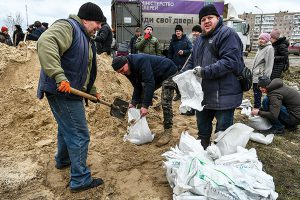Bloomberg
President Vladimir Putin was denounced for his “recklessness†after Ukraine said that Russian forces attacked a nuclear power plant, raising the stakes in the war and prompting calls for an even more robust response to the Kremlin’s aggression.
Nato foreign ministers and European leaders condemned what Kyiv described as an assault on the Zaporizhzhia facility in southeast Ukraine, Europe’s largest atomic generator. If confirmed, it would be the first time an operating nuclear plant has been deliberately targeted by military forces.
“The reckless actions leading to damage to the Zaporizhzhia nuclear plant were despicable,†UK Prime Minister Boris Johnson and French President Emmanuel Macron said in a statement after holding talks. Both nations pledged further humanitarian support “in the face of Putin’s increasingly savage and evil actions.â€
German Foreign Minister Annalena Baerbock said that “all channels†had been used to communicate to Russia that it shouldn’t commit such an act. “There are rules in this world, even for the Russian president,†she told reporters.
Russia’s Defense Ministry said that its forces have held the nuclear plant since Feb. 28 and accused Ukraine of a “provocation.†While Ukraine’s nuclear agency said that radiation levels at the site were normal, stocks dropped and commodities pushed higher as investors digested the implicati
Troops were close to a second nuclear plant, US Ambassador to the UN Linda Thomas-Greenfield told the Security Council, without naming the facility. “Russian forces are now 20 miles, and closing, from Ukraine’s second largest nuclear facility,†she said. The South Ukraine facility near Yuzhnoukrainsk is the country’s second largest plant, according to BloombergNEF.
Russia’s actions were roundly criticized at the Security Council, with a further meeting to convene Monday and discuss a resolution calling for unhindered humanitarian access in Ukraine. With more than a million people fleeing the fighting to neighboring countries, efforts are underway to try and establish humanitarian corridors to allow safe passage.
The Zaporizhzhia incident adds to a growing list of allegations against Russia as it presses its war against Ukraine. The Office of the UN High Commissioner for Human Rights recorded 1,006 civilian casualties from the start of the invasion on February 24, including 331 deaths, most due to shelling, missile and air strikes. The UN office said that it believed the real toll to be “considerably higher.â€
Nato Secretary General Jens Stoltenberg cited the use of cluster bombs in violation of international law and said allies were collecting details to hold Moscow to account. The Human Rights Watch group said in that Russian firing of cluster munitions into residential areas of Kharkiv, Ukraine’s second largest city, on February 28 may rise to the level of a war crime.
Addressing his Security Council, Putin claimed that Russian troops are fighting “neo-Nazis†and forces from outside Ukraine, whom he accused of using civilians as human shields and holding foreigners hostage.
Just hours later, according to Petro Kotin, the head of Ukraine’s Energoatom regulator, about 100 Russian military vehicles broke through a roadblock near the nuclear plant, entering the city of Energodar, and began to fire on the facility. A shell hit the plant’s first production unit, which was undergoing maintenance. The second and third units were put into safe “cold mode†and the fourth remains in operation, as it’s at the most distance from the shelling zone, Kotin said.
 The Gulf Time Newspaper One of the finest business newspapers in the UAE brought to you by our professional writers and editors.
The Gulf Time Newspaper One of the finest business newspapers in the UAE brought to you by our professional writers and editors.
